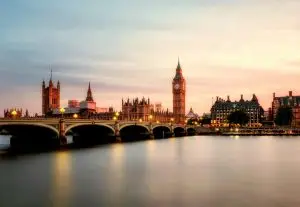Following its landslide victory, the Labour Party has been navigating a tumultuous first 100 days in government. While challenges such as far-right riots, donations, and Sue Gray’s demotion have dominated headlines, Labour has nonetheless made significant strides in delivering its energy policy commitments.
Brevia Energy closely monitors Labour’s progress in delivering against key energy policy commitments in its manifesto via our online tracker. This article examines Labour’s key achievements during this initial period.
Ramping up Renewable Capacity
Labour’s focus on meeting its 2030 clean power mission has overall yielded positive results for the renewable generation sector. Contracts for Difference (CfD) Allocation Round 6 (AR6) secured a record 131 clean energy projects, with the highest budget to date. AR6 also rectified the mistakes of AR5, managing to secure 4.9 GW of offshore wind capacity.[1]
Whilst increasing the budget for AR6 will help bolster investor confidence in the sector, the Government must go further if it is to meet the 28GW shortfall to deliver its 55GW target for offshore wind.
Planning reform has been at the heart of the Government’s strategy to deliver new renewable capacity. Within days of taking office, the Housing Secretary lifted the de facto ban on onshore wind, placing onshore wind on the same footing as other energy developments in the National Planning Policy Framework.[2] The Energy Secretary was also quick to approve several solar DCO projects that were stalled under the previous administration, consenting 1.9 GW of solar capacity since coming into office.
These decisions act as a clear signal to industry and investors that the Government will act to address barriers posed by the planning system in delivering its clean energy ambitions.
Forming a Mission-Driven Government
The appointments made by Government have in many ways been just as important as its policy announcements in signalling a new direction for the UK energy sector. Only a week after the election, Energy Secretary Ed Miliband MP appointed former CEO of the Climate Change Committee, Chris Stark, as the Head of Mission Control, underscoring the Government’s laser focus on delivering its 2030 clean power mission.[3] Already, Stark has engaged NESO to provide recommendations on meeting the 2030 target. NESO’s advice, due in Autumn 2024, will be crucial in shaping the Government’s strategy to deliver its mission moving forward.
The establishment of the Clean Power 2030 Advisory Commission will bolster Stark’s efforts to achieve this target, drawing on expertise from across the sector including the Electricity Networks Commissioner Nick Winser and President of the Energy Institute Juliet Davenport.[4]
Chris Stark has set out a three-point approach for Mission Control. The first is to produce a plan to deliver the Government’s 2030 target. Second, to demonstrate it can be delivered. Third, to remove barriers to delivery. This plan, and how the Government defines a ‘clean energy system’ will be key things to look out for this side of Christmas.
Building GB Energy
Labour has also taken significant strides to deliver one of its flagship manifesto commitments: establishing GB Energy. The Great British Energy Bill has progressed to the Committee Stage in the House of Commons, meanwhile the GB Energy Founding Statement, published in July, set out in greater detail what the publicly-owned energy company will seek to achieve, the case for its establishment, and its structure.[5] However, there are still questions over exactly how GB Energy will interact with different actors in the UK energy system.
Alongside the establishment of GB Energy, the Energy Secretary announced a strategic partnership between GB Energy and the Crown Estate, which will bring forward new offshore wind developments and seek to lower risk for developers at future leasing rounds.[6] This partnership is just one example of how Labour is turning governmental bodies’ focus towards delivering 2030 and creating an enabling policy and regulatory environment for the renewable energy industry.
Conclusion
While Labour’s first 100 days have been marked by various challenges, the Party has demonstrated a clear commitment to advancing its energy policy objectives. The successes in expanding renewable capacity indicate a positive trajectory. However, there are inevitably gaps in the Government’s progress, where it is incumbent on industry to push for faster progress on key manifesto commitments. Companies across the sector can keep track of Labour’s priorities for energy policy via Brevia Energy’s Labour Party Manifesto Progress Tracker, which continues to monitor the progress of Government in delivering on its manifesto commitments.
Our Manifesto Tracker is structured to provide clear and up-to-date information on progress the Government is making to deliver on its energy pledges. If you have any comments or queries about the information contained in the tracker, please let us know by emailing energytracker@brevia.co.uk. Note that the tracker is available to access by companies in the energy sector, industry commentators, and political stakeholders. Brevia Energy reserves the right to restrict access to the tracker.
The progress tracker is accessible by the completing the short form below.
[wpforms id=”9793″]
Notes
[1] Department for Energy Security and Net Zero, ‘Government secures record pipeline of clean cheap energy projects’, 3 September 2024, Link
[2] Department for Levelling Up, Housing & Communities, ‘Policy statement on onshore wind’, 8 July 2024, Link
[3] Department for Energy Security and Net Zero, ‘Chris Stark to lead Mission Control to deliver clean power by 2030’, 9 July 2024, Link
[4] Department for Energy Security and Net Zero, ‘Energy experts appointed to deliver clean power 2030 mission’, 10 October 2024, Link
[5] Department for Energy Security and Net Zero, ‘Introducing Great British Energy’, 25 July 2024, Link
[6] The Crown Estate, ‘The Crown Estate to partner with Great British Energy’, 25 July 2024, Link




